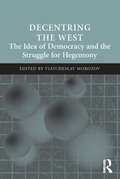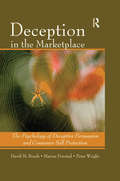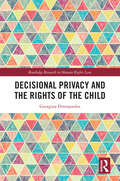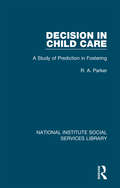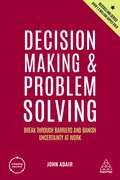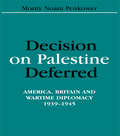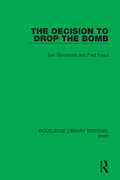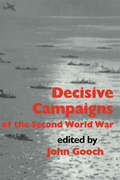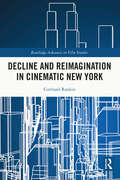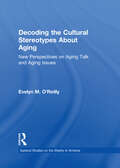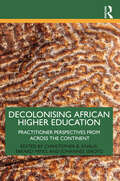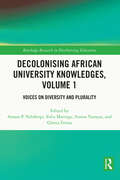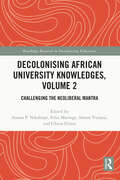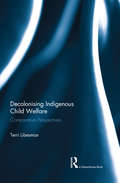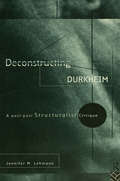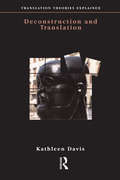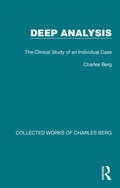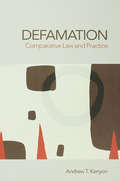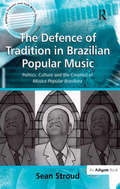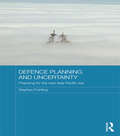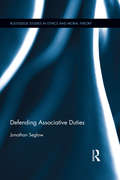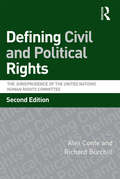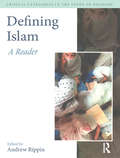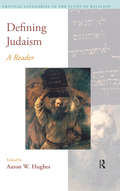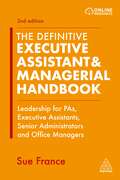Special Collections
Benetech’s Global Certified Accessible Titles
Description: Benetech’s GCA program is the first independent third-party EPUB certification to verify ebook accessibility. By creating content that is born accessible, publishers can meet the needs of all readers. Learn more: https://bornaccessible.benetech.org/
- Table View
- List View
Decentring the West
by Viatcheslav MorozovWe live in a world where democracy is almost universally accepted as the only legitimate form of government but what makes a society democratic remains far from clear. Liberal democratic values are both relativized by the self-description of many non-democratic regimes as 'local' or 'culturally specific' versions of democracy, and undermined by the automatic labelling as 'democratic' of all norms and institutions that are modelled on western states. Decentring the West: The Idea of Democracy and the Struggle for Hegemony aims to demonstrate the urgent need to revisit the foundations of the global democratic consensus. By examining the views of democracy that exist in the countries on the semi-periphery of the world system such as Russia, Turkey, Bolivia, Venezuela, Brazil and China, as well as within the core (Estonia, Denmark and Sweden) the authors emphasize the truly universal significance of democracy, also showing the value of approaching this universality in a critical manner, as a consequence of the hegemonic position of the West in global politics. By juxtaposing, critically re-evaluating and combining poststructuralist hegemony theory and postcolonial studies this book demonstrates a new way to think about democracy as a truly international phenomenon. It thus contributes groundbreaking, thought-provoking insights to the conceptual and normative aspects of this vital debate.
Deception In The Marketplace
by Peter Wright and David M. Boush and Marian FriestadThis is the first scholarly book to fully address the topics of the psychology of deceptive persuasion in the marketplace and consumer self-protection. Deception permeates the American marketplace. Deceptive marketing harms consumers’ health, welfare and financial resources, reduces people’s privacy and self-esteem, and ultimately undermines trust in society. Individual consumers must try to protect themselves from marketers’ misleading communications by acquiring personal marketplace deception-protection skills that go beyond reliance on legal or regulatory protections. Understanding the psychology of deceptive persuasion and consumer self-protection should be a central goal for future consumer behavior research. The authors explore these questions. What makes persuasive communications misleading and deceptive? How do marketing managers decide to prevent or practice deception in planning their campaigns? What skills must consumers acquire to effectively cope with marketers’ deception tactics? What does research tell us about how people detect, neutralize and resist misleading persuasion attempts? What does research suggest about how to teach marketplace deception protection skills to adolescents and adults? Chapters cover theoretical perspectives on deceptive persuasion; different types of deception tactics; how deception-minded marketers think; prior research on how people cope with deceptiveness; the nature of marketplace deception protection skills; how people develop deception protection skills in adolescence and adulthood; prior research on teaching consumers marketplace deception protection skills; and societal issues such as regulatory frontiers, societal trust, and consumer education practices. This unique book is intended for scholars and researchers. It should be essential reading for upper level and graduate courses in consumer behavior, social psychology, communication, and marketing. Marketing practitioners and marketplace regulators will find it stimulating and authoritative, as will social scientists and educators who are concerned with consumer welfare.
Decisional Privacy and the Rights of the Child
by Georgina DimopoulosDecisional privacy gives individuals the freedom to act and make decisions about how they live their lives, without unjustifiable interference from other individuals or the state. This book advances a theory of a child’s right to decisional privacy. It draws on the framework of the United Nations Convention on the Rights of the Child and extends the work of respected children’s rights scholars to address a significant gap in understanding the interconnections between privacy, family law and children’s rights. It contextualises the theory through a case study: judicial proceedings concerning medical treatment for children experiencing gender dysphoria. This work argues that recognising a substantive right to decisional privacy for children requires procedural rights that facilitate children’s meaningful participation in decision-making about their best interests. It also argues that, as courts have increasingly encroached upon decision-making regarding children’s medical treatment, they have denied the decisional privacy rights of transgender and gender diverse children. This book will benefit researchers, students, judicial officers and practitioners in various jurisdictions worldwide grappling with the tensions between children’s rights, parental responsibilities and state duties in relation to children’s best interests, and with the challenge of better enabling and listening to children’s voices in decision-making processes.
Decision in Child Care
by R. A. ParkerResponsible decisions are continually being made in social work. In particular the decision to place a child in a foster home can have far-reaching consequences for their welfare and it is vital that we make the best possible choice on their behalf. Although in the 1960s thousands of children were boarded out every year no systematic attempt had yet been made to summarize this experience as a guide for practice. Thus important decisions lacked the help which past experience could provide. Originally published in 1966, this study assembled the past experience of foster care in one area, analysed it and presented it in such a way that predictions could be made of the outcome of a potential placement. At the time it offered an important contribution to the task of providing the best possible care for children separated from their own families. Today it can be read in its historical context.
Decision Making and Problem Solving
by John AdairThought leader John Adair provides the techniques and insights you need to find solutions, spark creativity and confidently make the right decisions. This 5th edition now features even more practical exercises, useful templates, and top tips to provide a clear framework that can generate ideas and inspire confidence in your team - so you can spot the solution in every problem, and create ideas to rival even the best strategists.The Creating Success series of books...Unlock vital skills, power up your performance and get ahead with the bestselling Creating Success series. Written by experts for new and aspiring managers and leaders, this million-selling collection of accessible and empowering guides will get you up to speed in no time. Packed with clever thinking, smart advice and the kind of winning techniques that really get results, you'll make fast progress, quickly reach your goals and create lasting success in your career.
Decision on Palestine Deferred
by Monty Noam PenkowerProfessor Penkower's latest book, Decision on Palestine Deferred, offers the first sustained, documented account of Palestine and the Anglo-American alliance during the Second World War. Firmly grounded in three decades of archival research, his spirited narrative offers a fascinating cast of characters against the backdrop of the larger Middle Eastern context. The latter relates to Jewish and Arab activities during the War, the grave threat of Erwin Rommel's Afrika Korps, U.S. interest in Saudi Arabian oil, and the effort to achieve Arab unity. Zionism's shift to viewing the United States as the center of decision making in international affairs, and hence the Archimedean point for forging Jewry's destiny, occurred in these same six years. British anxieties about imperial security, while administering the Palestine mandate by means of a stringent immigration quota, jostled with the first American steps taken to formulate a stance vis-à-vis Palestine, and the region as a whole. The differing approaches of Churchill and Roosevelt to the Palestine imbroglio are also explored, as are the varied avenues that were then championed within the Jewish camp. The impact of the Holocaust, with both governments breathing the very spirit of defeatism and despair, surfaces throughout.
The Decision to Drop the Bomb
by Len Giovannitti and Fred FreedThis book, first published in 1967, examines the circumstances and events that led to the dropping of two atomic bombs on Japan, devastating Hiroshima and Nagasaki. The death of President Roosevelt three weeks before the end of the European war led to an incoming President, Truman, who had heard nothing of the project before taking office. He and his advisers had no precedents to guide them as they considered what to do, and withing their closely drawn circle there were genuine differences of opinion about the use of atomic weapons. This book traces the course of the discussions between the politicians and their technical advisers, the part played by personal relationships, and the attempt by some of the scientists to stop the bomb being used without warning. In addition, it supplies a thorough analysis of developments abroad, and in particular the situation in Japan. It shows that the debate in Washington and the atomic plants was careful and wide-ranging, and that issues are no less complex for being supremely important. The result is to provide both a study of decision-making and a valuable contribution to our understanding of the closing months of the Second World War.
Decisive Campaigns of the Second World War
by John GoochSuccess or defeat in the Second World War turned less on winning or losing battles than on winning or losing campaigns. This volume reassesses the importance of seven major campaigns for the outcome of the war. The authors examine a wide range of factors which influence success or failure including strategic planning, logistics, combat performance, command and military intelligence. This book represents a novel contribution to the study of the Second World War.
Decline and Reimagination in Cinematic New York
by Cortland RankinDecline and Reimagination in Cinematic New York examines the cinematic representation of New York from the mid-1960s through the mid-1980s, placing the dominant discourse of urban decline in dialogue with marginal perspectives that reimagine the city along alternative paths as a resilient, adaptive, and endlessly inspiring place. Drawing on mainstream, independent, documentary, and experimental films, the book offers a multifaceted account of the power of film to imagine the city’s decline and reimagine its potential. The book analyzes how filmmakers mobilized derelict space and various articulations of “nature” as settings and signifiers that decenter traditional understandings of the city to represent New York alternately as a desolate wasteland, a hostile wilderness, a refuge and playground for outcasts, a home to resilient and resourceful communities, a studio for artistic experimentation, an arcadia conducive to alternative social arrangements, and a complex ecosystem. This book will be of interest to scholars and students of film studies, media studies, urban cinema, urban studies, and eco-cinema.
Decoding the Cultural Stereotypes About Aging
by Evelyn M. O'ReillyThis collection will present works that offer illuminating perspectives on the remarkably diverse Asian American populations of the United States. As a population that is neither black nor white, the range of experiences of these groups, many of whom arrived as refugees, presents other perspectives on the cultural mosaic that constitutes the United States. Studies of Asian Americans sheds light on issues related to immigration, refugee policy, transnationalism, return migration, cultural citizenship, ethnic communities, community building, identity and group formation, panethnicity, race relations, gender and class, entrepreneurship, employment, representation, politics, adaptation, and acculturation. The writings in this collection are drawn from a wide variety of disciplines to provide a broad and informative array of insights on these fascinating and diverse populations.
Decolonising African Higher Education
by Christopher B. Knaus and Takako Mino and Johannes SerotoAcross the African continent, college student activists have long fought to decolonise African institutions. Reflecting ongoing Western colonisation, however, Indigenous African languages, thought, and structures remain excluded from African universities. Such universities remain steeped in Eurocentric modes of knowing, teaching, researching, and communicating. Students are rarely afforded the opportunity to learn about the wealth of knowledge and sustainable wisdom that was and is generated by their own home communities. Such localised Indigenous African perspectives are critical in a world committed to anti-Black racism, capitalist materialism, and global destruction. This book thus clarifies decolonial efforts to transform higher education from its anti-Black foundation, offering hope from universities across the continent. Writers are university administrators and faculty who directly challenge contemporary colonial education, exploring tangible ways to decolonise structures, curricula, pedagogy, research, and community relationships. Ultimately, this book moves beyond structural transformation to call for a global commitment to develop Indigenous African-led systems of higher education that foster multilingual communities, local knowledges, and localised approaches to global problems. In shifting from a Western-centric lens to multifaceted African-centrism, the authors reclaim decoloniality from co-optation, repositioning African intellectualism at the core of global higher education to sustain an Ubuntu-based humanity.
Decolonising African University Knowledges, Volume 1
by Felix Maringe and Amasa P. Ndofirepi and Simon Vurayai and Gloria ErimaThis timely work investigates the possibility of unyoking and decolonising African university knowledges from colonial relics. It claims that academics from socially, politically, and geographically underprivileged communities in the South need to have their voices heard outside of the global power structure. The book argues that African universities need a relevant curriculum that is related to the cultural and environmental experiences of diverse African learners in order to empower themselves and transform the world. It is written by African scholars and is based on theoretical and practical debates on the epistemological complexities affecting and afflicting diversity in higher education in Africa. It examines who are the primary custodians of African university knowledges, as well as how this relates to forms of exclusion affecting women, the differently abled, the rural poor, and ethnic minorities, as well as the significance of the Fourth Industrial Revolution in the future of African universities. The book takes an epistemological approach to university teaching and learning, addressing issues such as decolonization and identity, social closure and diversity disputes, and the obstacles that come with the neoliberal paradigm. The book will be necessary reading for academics, scholars, and postgraduate students in the fields of Sociology of Education, decolonising education, Inclusive Education, and Philosophy of Education, as it resonates with existing discourses.
Decolonising African University Knowledges, Volume 2
by Felix Maringe and Amasa P. Ndofirepi and Simon Vurayai and Gloria ErimaThis book explores the influence of neoliberal globalisation on African higher education, considering the impact of the politics of neoliberal ideology on the nature and sources of knowledge in African universities. Written by African scholars, the book engages with debates around the commodification of knowledge, socially just knowledge, knowledge transformation, collaboration, and partnerships, and indigenous knowledge systems. It challenges the neoliberal approach to knowledge production and dissemination in African universities and contributes to debates around decolonising knowledge production in Africa. The chapters draw on experiences from universities in different sub-Saharan countries to show how the manifestation of neo-colonialism through the pursuit of the hegemonic neoliberal philosophy is impacting on decolonising university knowledge in Africa. Providing a unique critique of the impact of neoliberal higher education in Africa, the book will be essential reading for researchers, scholars, and postgraduate students in the field of Sociology of Education, decolonising education, Inclusive Education, and Education Policy.
Decolonising Indigenous Child Welfare
by Terri LibesmanDuring the past decade, a remarkable transference of responsibility to Indigenous children’s organisation has taken place in many parts of Australia, Canada, the USA and New Zealand. It has been influenced by Indigenous peoples’ human rights advocacy at national and international levels, by claims to self-determination and by the globalisation of Indigenous children’s organisations. Thus far, this reform has taken place with little attention from academic and non-Indigenous communities; now, Decolonising Indigenous Child Welfare: Comparative Perspectives considers these developments and, evaluating law reform with respect to Indigenous child welfare, asks whether the pluralisation of responses to their welfare and well-being, within a cross-cultural post-colonial context, can improve the lives of Indigenous children. The legislative frameworks for the delivery of child welfare services to Indigenous children are assessed in terms of the degree of self-determination which they afford Indigenous communities. The book draws upon interdisciplinary research and the author’s experience collaborating with the peak Australian Indigenous children’s organisation for over a decade to provide a thorough examination of this international issue. Dr Terri Libesman is a Senior Lecturer in the Law Faculty, at the University of Technology Sydney. She has collaborated, researched and published for over a decade with the peak Australian Indigenous children’s organisation.
Deconstructing Durkheim
by Jennifer M. LehmannThe author analyzes Durkheim's social theory from the standpoint of critical structuralism. She explores Durkheim's discussion of the relationship between the individual and society. She also addresses the question of Durkheim's understanding of the relationship between the subject and object of knowledge, and the relationship between truth and ideology.
Deconstruction and Translation
by Kathleen DavisDeconstruction and Translation explains ways in which many practical and theoretical problems of translation can be rethought in the light of insights from the French philosopher Jacques Derrida. If there is no one origin, no transcendent meaning, and thus no stable source text, we can no longer talk of translation as meaning transfer or as passive reproduction. Kathleen Davis instead refers to the translator's freedom and individual responsibility. Her survey of this complex field begins from an analysis of the proper name as a model for the problem of signification and explains revised concepts of limits, singularity, generality, definitions of text, writing, iterability, meaning and intention. The implications for translation theory are then elaborated, complicating the desire for translatability and incorporating sharp critique of linguistic and communicative approaches to translation. The practical import of this approach is shown in analyses of the ways Derrida has been translated into English. In all, the text offers orientation and guidance through some of the most conceptually demanding and rewarding fields of contemporary translation theory.
Deep Analysis
by Charles BergFirst published in 1947, with a second edition in 1950, the original blurb reads: 'This is an illuminating description of a complete Freudian analysis of a single case. From the first interview to the last the reader’s attention is engrossed with the almost-normal personality of the individual who is being analysed. We see his thoughts, philosophy, and emotions gradually unfolding under the application of analytical technique (lightly explained in the second chapter), until – and this is where the book is such a tremendous advance upon the psychological novel – the very springs and mechanisms of his psychic pattern and emotional structure are abundantly and lucidly revealed. We see and understand the hidden depths of the nature of the human mind, and obtain introductory insight not only into normal mental functioning, but into almost all its psychopathic aberrations including frigidity, impotence, love, hate, hysteria, obsessions, and even paranoia and schizophrenia – all in minor degrees an integral part of normality. In spite of this the book is light reading and, though particularly instructive to doctor and professional psychologist, understandable to the average intelligent layman.' This book is a re-issue originally published in 1950. The language used is a reflection of its era and no offence is meant by the Publishers to any reader by this re-publication.
Defamation
by Andrew KenyonDefamation: Comparative Law and Practice offers a timely and original investigation into defamation law and litigation practice in England, Australia and the United States, combining close legal analysis and extensive empirical research to examine central aspects of defamation law. This groundbreaking contribution to legal knowledge will be useful to researchers, academics, students and practitioners working in media and communications law. It will enable lawyers outside the US to make more informed use of US law and commentary and it sets out, in an accessible manner, the intricacies of English and Australian defamation law and practice for US legal readers.
The Defence of Tradition in Brazilian Popular Music
by Sean StroudSean Stroud examines how and why Música Popular Brasileira (MPB) has come to have such a high status, and why the musical tradition (including MPB) within Brazil has been defended with such vigour for so long. He emphasizes the importance of musical nationalism as an underlying ideology to discussions about Brazilian popular music since the 1920s, and the key debate on so-called 'cultural invasion' in Brazil. The roles of those responsible for the construction of the idea of MPB are examined in detail. Stroud analyses the increasingly close relationship that has developed between television and popular music in Brazil with particular reference to the post-1972 televised song festivals. He goes on to consider the impact of the Brazilian record industry in the light of theories of cultural imperialism and globalization and also evaluates governmental intervention relating to popular music in the 1970s. The importance of folklore and tradition in popular music that is present in both Mário de Andrade and Marcus Pereira's efforts to 'musically map' Brazil is clearly emphasized. Stroud contrasts these two projects with Hermano Vianna and Itaú Cultural's similar ventures at the end of the twentieth century that took a totally different view of musical 'authenticity' and tradition. Stroud concludes that the defence of musical traditions in Brazil is inextricably bound up with nationalistic sentiments and a desire to protect and preserve. MPB is the musical expression of the Brazilian middle class and has traditionally acted as a cultural icon because it is associated with notions of 'quality' by certain sectors of the media.
Defence Planning and Uncertainty
by Stephan FrühlingHow can countries decide what kind of military forces they need, if threats are uncertain and history is full of strategic surprises? This is a question that is more pertinent than ever, as countries across the Asia-Pacific are faced with the military and economic rise of China. Uncertainty is inherent in defence planning, but different types of uncertainty mean that countries need to approach decisions about military force structure in different ways. This book examines four different basic frameworks for defence planning, and demonstrates how states can make decisions coherently about the structure and posture of their defence forces despite strategic uncertainty. It draws on case studies from the United States, Australian and New Zealand, each of which developed key concepts for their particular circumstances and risk perception in Asia. Success as well as failure in developing coherent defence planning frameworks holds lessons for the United States and other countries as they consider how best to structure their military forces for the uncertain challenges of the future.
Defending Associative Duties
by Jonathan SeglowThis book explores the associative duties we owe to our children, parents, friends, colleagues, associates and compatriots and defends a novel account which justifies such duties through the realization of values that are produced in these various kinds of social relationships. Seglow engages with several key contemporary debates including parental rights over children’s education, the burdens of eldercare, permissible partiality to friends, and global justice versus compatriot duties.
Defining Civil and Political Rights
by Alex Conte and Richard BurchillDefining Civil and Political Rights provides a comprehensive analysis and commentary on the decisions - technically known as views - of the United Nations Human Rights Committee, for use by human rights lawyers throughout the world. Each of the substantive rights and freedoms set out in the International Covenant on Civil and Political Rights is considered in detail, by analysis of final reviews and comments of the Human Rights Committee. This second edition has been thoroughly revised and updated to take account of recent jurisprudence on the Human Rights Committee. New material has been added based upon substantive areas of the committee's jurisprudence.
Defining Islam
by Andrew RippinEver since a group of people came into existence who called themselves Muslims and followed Islam, questions of what it means to be a member of this group - who is to be included/excluded and what the requirements for membership are - have proven to be both divisive and defining. For scholars and critics, the issue of what constitutes or defines 'Islam' - whether examining the history of the religion, its specific traditions, sectarian politics, or acts of terrorist - is central to any understanding of issues, cultures and ideas. 'Defining Islam' brings together key classic and contemporary writings on the nature of Islam to provide student readers with the ideal collection of both primary and critical sources.
Defining Judaism
by Aaron W. HughesJudaism is a monotheistic religion with a history of over 3,500 years. 'Defining Judaism' illustrates the range of theoretical and practical issues required for comparative and historical study of the faith. The texts range from historical attempts to define individual 'Jews' to imagining Judaism as a religion like other religions, to modern and post-modern attempts to decentre these earlier definitions. The reader brings together a wide range of essays from influential scholars of ancient and contemporary Judaism to attempt a full picture of Judaism that will be of interest to all those involved in the study of religion.
The Definitive Executive Assistant & Managerial Handbook
by Sue FranceWINNER: PA Voice Awards 2015 - Best Book for a PA (1st edition) With the world of work profoundly disrupted by artificial intelligence, machine learning and COVID-19, the role of the executive assistant is changed forever. Learn how to respond to these challenges and help create 'the better normal' while developing the leadership skills necessary to thrive in a senior administrative position. From bestselling author and expert Sue France, The Definitive Executive Assistant & Managerial Handbook is the ultimate guide to management in the context of an administrative role. Placing an emphasis on both personal leadership and practical skills, this new edition of the award-winning book teaches readers to manage a team, develop the emotional intelligence to understand their colleagues, negotiate effectively and confidently manage a project. Equipped with these tools, readers will be ready to steer their teams to organizational success in any situation. With new sections on best practice for managing remote workers and building a responsible relationship with new technologies, The Definitive Executive & Managerial Handbook is an indispensable guide for both ambitious PAs aiming for promotion and senior assistants who want to improve their skills.
